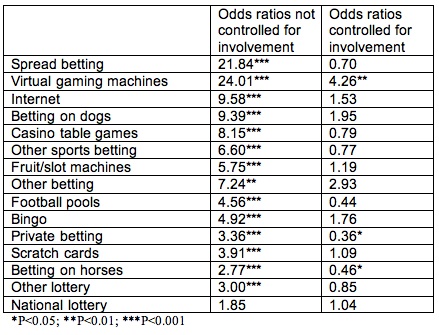The WAGER, Vol. 15(5) – The 2007 British Gambling Prevalence Survey: Considering Gambling Involvement
Conventional wisdom suggests that specific gambling activities, such as Internet gambling, are especially “addictive.” However, recent research suggests that the relationship between gambling and disordered gambling is more complicated than playing specific types of games. Using a United States youth sample, research suggests that gambling involvement (e.g., the number of games one plays), is a better predictor of disordered gambling than participation in any particular game (Welte, Barnes, Tidwell, & Hoffman, 2009). This week the WAGER reviews a study that further explored this phenomena by examining the association between disordered gambling and gambling involvement within the 2007 British Gambling Prevalence Survey (LaPlante, Nelson, LaBrie, & Shaffer, 2009).
Methods
- LaPlante et al. (2009) conducted secondary data analyses of the British Gambling Prevalence Survey (BGPS)1 using weighted data of 8968 observations characteristic of the general population.
- The researchers operationally defined the following variables.
- Disordered gambling (i.e., endorsing 3+ DSM-IV pathological gambling symptoms in the past year).
- Gambling involvement (i.e., the number of types of gambling for which an individual reported being involved during the past year).
- The authors conducted a series of logistic regressions using participation in each gambling type to predict past year disordered gambling.
- Consistent with Welte et al’s. analytic strategy (2009), these logistic regressions were conducted first without controlling for involvement and then added involvement as a control. Table 1 lists the corresponding odds ratios.
Table 1: Odd ratios for predicting disordered gambling from type of game with and without controlling for involvement (adapted from LaPlante et al. 2009)
- When not controlling for involvement, participation in nearly every gambling type was statistically significant and positively associated with disordered gambling.
- When controlling for involvement, gambling via virtual gaming machines (e.g., virtual roulette, virtual bingo, virtual keno) was the only gambling type that remained significantly and positively associated with disordered gambling.
Limitations
- This BGPS gathers self-reported data without corroboration; therefore, this study is subject to the problems commonly associated with self-report.
- The authors only used one measure of gambling involvement.
Discussion
LaPlante et al. (2009) examined associations between participation in a particular gambling type and disordered gambling. The results indicated that when the authors controlled for gambling involvement, the association between participation in a particular gambling type and disordered gambling weakened for all types, and for 13 of 14 types, this association was no longer meaningful. These findings are consistent with an emerging body of research that suggests gambling involvement is a better predictor of gambling problems than participation in a particular game (e.g., Welte et al., 2009). One limitation of this research is that the authors used only one measure of gambling involvement (i.e., the number of types of gambling for which an individual reported being involved during the past year). More research is necessary to examine other — and multiple — measures of involvement to more accurately refine the meaning of gambling involvement.
-Ryan Martin
What do you think? Please use the comment link below to provide feedback on this article.
References
American Psychiatric Association. (1994). DSM-IV: Diagnostic and statistical manual of mental disorders (Fourth ed.). Washington, D.C.: American Psychiatric Association.
LaPlante, D. A., Nelson, S. E., LaBrie, R. A., & Shaffer, H. J. (2009). The relationships between disordered gambling, type of gambling, and gambling involvement in the British Gambling Prevalence Survey 2007. European Journal of Public Health, epub ahead of print.
National Center for Social Research. (2008). British gambling prevalence survey 2007. Colchester, Essex: UK Data Archive.
Wardle, H., Sproston, K., Orford, J., Erens, B., Griffiths, M., Constantine, R., et al. (2007). British Gambling Prevalence Survey 2007. London: National Center for Social Research.
Welte, J., Barnes, G., Tidwell, M., & Hoffman, J. (2009). The association of form of gambling with problem gambling among American youth. Psychology of Addictive Behaviors, 23(1), 105-112.
—
1The National Centre for Social Research (2008) produced the 2007 British Gambling Prevalence Survey (BGPS). The BGPS is a publicly available dataset representing interviews from 9,003 residents, randomly selected from households in England, Scotland and Wales; the response rate was 52% (Wardle et al., 2007). The BGPS assessed various gambling-related and demographic measures, including the following: past year gambling participation for 15 gambling types (e.g., lottery, online gambling, etc.) and past year DSM-IV pathological gambling criteria (American Psychiatric Association, 1994).
